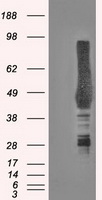Carbonic Anhydrase IX (CA9) Mouse Monoclonal Antibody [Clone ID: OTI1G7]
CAT#: CF500623
Carrier-free (BSA/glycerol-free) CA9 mouse monoclonal antibody, clone OTI1G7 (formerly 1G7)
Formulation: Standard
Frequently bought together (2)
Other products for "Carbonic Anhydrase IX"
Specifications
| Product Data | |
| Clone Name | OTI1G7 |
| Applications | FC, IHC, WB |
| Recommended Dilution | WB 1:2000, IHC 1:50, Flow 1:100 |
| Reactivities | Human |
| Host | Mouse |
| Isotype | IgG2b |
| Clonality | Monoclonal |
| Immunogen | Full-length protein expressed in 293T cell transfected with human CA9 expression vector |
| Formulation | Lyophilized powder (original buffer 1X PBS, pH 7.3, 8% trehalose) |
| Reconstitution Method | For reconstitution, we recommend adding 100uL distilled water to a final antibody concentration of about 1 mg/mL. To use this carrier-free antibody for conjugation experiment, we strongly recommend performing another round of desalting process. (OriGene recommends Zeba Spin Desalting Columns, 7KMWCO from Thermo Scientific) |
| Purification | Purified from mouse ascites fluids or tissue culture supernatant by affinity chromatography (protein A/G) |
| Conjugation | Unconjugated |
| Storage | Store at -20°C as received. |
| Stability | Stable for 12 months from date of receipt. |
| Predicted Protein Size | 49.7 kDa |
| Gene Name | carbonic anhydrase 9 |
| Database Link | |
| Background | Carbonic anhydrases (CAs) are a large family of zinc metalloenzymes that catalyze the reversible hydration of carbon dioxide. They participate in a variety of biological processes, including respiration, calcification, acid-basebalance, bone resorption, and the formation of aqueous humor, cerebrospinal fluid, saliva, and gastric acid. They show extensive diversity in tissue distribution and in their subcellular localization. CA IX is a transmembrane protein and the only tumor-associated carbonic anhydrase isoenzyme known. It is expressed in all clear-cell renal cell carcinoma, but is not detected in normal kidney or most other normal tissues. It may be involved in cell proliferation and transformation. This gene was mapped to 17q21.2 by fluorescence in situ hybridization, however, radiation hybrid mapping localized it to 9p13-p12. |
| Synonyms | CAIX; MN |
| Reference Data | |
| Protein Families | Druggable Genome, Transmembrane |
| Protein Pathways | Nitrogen metabolism |
Documents
| Product Manuals |
| FAQs |
| SDS |
Resources
| Antibody Resources |
{0} Product Review(s)
0 Product Review(s)
Submit review
Be the first one to submit a review
Product Citations
*Delivery time may vary from web posted schedule. Occasional delays may occur due to unforeseen
complexities in the preparation of your product. International customers may expect an additional 1-2 weeks
in shipping.






























































































































































































































































 Germany
Germany
 Japan
Japan
 United Kingdom
United Kingdom
 China
China






